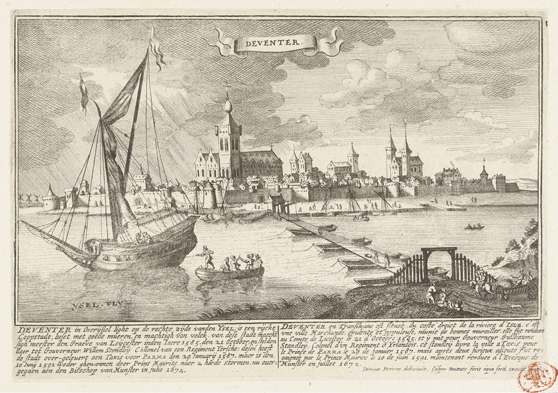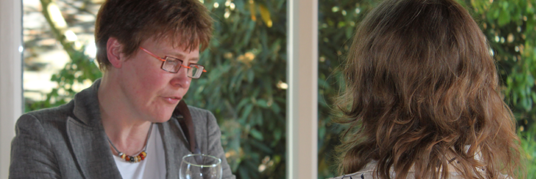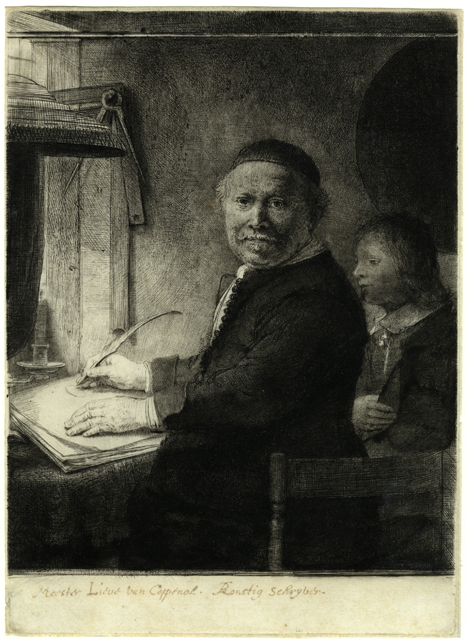* You are viewing Posts Tagged ‘Low Countries’
 Much of the seventeenth century was blighted by conflict, and the Thirty Years’ War, which stretched the length and breadth of Europe, affected every aspect of life. The implications for educational institutions and resulting intellectual networks and traditions were wide-ranging, and as such the Bodleian cards refer frequently to the effect of the conflict on universities and those teaching and studying within them. For example, in today’s card – sent on 3 February 1641, when war had been raging for over twenty years – John Christenius (1599-1672) laments the ‘injurious effect’ of the pan-European conflict on ‘the quality of the intake and studies at his university’. The original card compiler speculated that this letter might have been written from Deventer (where Erasmus had been at school a century and a half before, and the economic decline of which was attributed to religious war), and in Dirk van Miert‘s Humanism in an Age of Science: The Amsterdam Athenaeum in the Golden Age, 1632-1704 we read that from 1637 Christenius had indeed held a position at the newly formed Deventer Athenaeum. As students rush their work, emerging ‘unfit for a profession or status’, Christenius suggests to Gerardus Joannes Vossius (1577-1649), professor of history at Amsterdam’s Anthenaeum Illustre, that a teacher capable of inspiring the ‘studiously inclined young men to cultivate their minds towards a more scholarly standard’ be found, recommending the appointment of Hamburg-born Johann Frederick Gronovius (1611-1671). This suggestion met with approval and, following travels in England, France, and Italy, Gronovius was duly appointed professor of rhetoric and history at Deventer, a post he retained until his transfer to Leiden in 1658.
Much of the seventeenth century was blighted by conflict, and the Thirty Years’ War, which stretched the length and breadth of Europe, affected every aspect of life. The implications for educational institutions and resulting intellectual networks and traditions were wide-ranging, and as such the Bodleian cards refer frequently to the effect of the conflict on universities and those teaching and studying within them. For example, in today’s card – sent on 3 February 1641, when war had been raging for over twenty years – John Christenius (1599-1672) laments the ‘injurious effect’ of the pan-European conflict on ‘the quality of the intake and studies at his university’. The original card compiler speculated that this letter might have been written from Deventer (where Erasmus had been at school a century and a half before, and the economic decline of which was attributed to religious war), and in Dirk van Miert‘s Humanism in an Age of Science: The Amsterdam Athenaeum in the Golden Age, 1632-1704 we read that from 1637 Christenius had indeed held a position at the newly formed Deventer Athenaeum. As students rush their work, emerging ‘unfit for a profession or status’, Christenius suggests to Gerardus Joannes Vossius (1577-1649), professor of history at Amsterdam’s Anthenaeum Illustre, that a teacher capable of inspiring the ‘studiously inclined young men to cultivate their minds towards a more scholarly standard’ be found, recommending the appointment of Hamburg-born Johann Frederick Gronovius (1611-1671). This suggestion met with approval and, following travels in England, France, and Italy, Gronovius was duly appointed professor of rhetoric and history at Deventer, a post he retained until his transfer to Leiden in 1658.
According to other EMLO records, Gronovius was no stranger to the city. In 1631 he was writing from there and, by January 1644, the scholarly situation at the Athenaeum appears to have improved to such an extent under the auspices of its new star professor that Vossius praises the ‘great flow of good works from G’s. university and hopes that this will stimulate the senators of G’s. city, renowned for its academic traditions and as the place where Erasmus studied, to provide further for the dissemination of the university’s world-wide fame through monumental works of genius and learning’. Although he encountered problems – see the complications concerning one particular ‘homicidal maniac’ – Gronovius found his lectures ‘well attended’, and it’s a relief to find a productive pedagogical outcome despite (or perhaps even because of) the persistent maelstrom of war.
Miranda is editing metadata from the Bodleian card catalogue of correspondence for our union catalogue, Early Modern Letters Online. On a regular basis, she brings us hand-picked and contextualised records.
Launch Record of the Week
James Brown
June 23, 2010
Events, Lectures, Project Updates
Tags: Digitization, Europe, France, Isaac Casaubon, Joseph Justus Scaliger, Low Countries, Richard Thomson, Seventeenth Century
In the seventh and penultimate installment of the Project’s seminar series on Thursday 10 June, a large audience enjoyed papers by Dr Dirk van Miert (Huygens Institute) and Dr Paul Botley (Warburg Institute), both postdoctoral fellows on the Scaliger Correspondence Project, established by Professor Anthony Grafton. In his opening contribution, van Miert explored ‘The Seventeenth-Century Culture of Editing Scholarly Correspondences: The Case of Joseph Scaliger’. Via a fascinating case study of several early seventeenth-century editions of the correspondence of the French scholar (especially that prepared by Daniel Heinsius), he argued that in an early instance of the ‘institutionalisation’ of the Republic of Letters it was increasingly common for lavish printed editions of the correspondence of intellectuals to appear during or immediately after their lifetimes, often prepared by former students (Heinsius studied under Scaliger). In his concluding contribution, Botley switched the focus to two less high-profile denizens of the Republic of Letters in a paper entitled ‘The Letters of Isaac Casaubon (1559–1614) and Richard Thomson (c.1570–1613)’. Botley described his attempts to bring Casaubon’s c.2400 surviving letters (254 exchanged with Scaliger) to a wider scholarly audience by means of a definitive online edition, and introduced us to the letters of the little-known philologist and Church of England clergyman Richard Thomson, a regular correspondent of both Scaliger and Casaubon. Seminars take place in the Faculty of History on George Street on Thursdays at 3pm. For past seminars in the series, please see here.
 Podcast now available on the seminar page!
Podcast now available on the seminar page!
James Brown
June 09, 2010
Events, Lectures, Project Updates
Tags: Amsterdam, Antoinette Bourignon, Book History, Communication, Gender, Jan Amos Comenius, Low Countries, Networks, Religion, Seventeenth Century, Women

Discussions continue with Professor de Baar during the wine reception.
In the sixth installment of the Project’s seminar series on Thursday 3 June, Professor Mirjam de Baar (University of Groningen) described the epistolary practice and strategies of a seventeenth-century female prophet and mystic in a paper entitled ‘The Re-construction of a Spiritual Network: The Correspondence of Antoinette Bourignon (1616-1680)’. From her base in Amsterdam (where she purchased her own press in the late 1660s), Bourignon used a variety of textual media to disseminate the message that she was a spiritual leader – ‘The Mother’ – chosen by God to restore true Christianity on earth, and to consolidate a following around this ecumenical identity. Bourignon’s letters, argued de Baar, were central to this programme; over 600 manuscript versions survive (both originals and scribal copies), eleven different printed editions appeared during her lifetime, while nine further volumes were subsequently published posthumously. Her correspondents included luminaries such as Jan Amos Comenius (1592-1670), Robert Boyle (1627-1691), Jan Swammerdam (1637-80), and Pierre Poiret (1646-1719), as well as a wide range of socially diverse disciples who wrote to her seeking advice on a variety of spiritual and personal issues, and whose preoccupations and voices are anonymously reproduced in published responses. In consequence, her letters have a dialogic, polyphonous quality, while the same followers who wrote to her seeking guidance in turn represented an important market for the letters in their printed manifestations, suggesting a close relationship between epistolarity and the mechanics of early modern publishing, and the existence of a shrewd business model beneath the spiritual discourse (a point further underlined during subsequent discussion). Despite her failure to establish a long-term community on the island of Nordstrand, and the fact that in the later years of her life the suspicions of Lutheran clergy forced her into exile in Eastern Friesland, Bourignon maintained a prolific output of letters, and continued to combine the roles of spiritual leader, publisher of epistolary collections, and manager of what might be interpreted as a spiritually driven commercial enterprise. Seminars take place in the Faculty of History on George Street on Thursdays at 3pm. For future seminars in the series, please see here.
 Podcast now available on the seminar page!
Podcast now available on the seminar page!
 A workshop on ‘Go-Betweens, Translations and the Circulation of Knowledge in the Early Modern Low Countries’ will take place on 13-14 November 2009 at UCL’s Wellcome Trust Centre for the History of Medicine. Speakers include Sven Dupré, Toon Van Hal, Candice Delisle, Florike Egmond, Philippe Selosse, Benjamin Schmidt, Roger Hart, Matthias Schemmel, Peter Burke, Felicity Henderson, and Harold Cook. The workshop is organized by Harold Cook (UCL) and Sven Dupré (Ghent), in association with the Research Network Circulating Knowledge in Early Modern Science. For a programme, please see the workshop flyer (pdf). Registration and inquiries should be made to the Programmes Administrator, Miss Sally Bragg.
A workshop on ‘Go-Betweens, Translations and the Circulation of Knowledge in the Early Modern Low Countries’ will take place on 13-14 November 2009 at UCL’s Wellcome Trust Centre for the History of Medicine. Speakers include Sven Dupré, Toon Van Hal, Candice Delisle, Florike Egmond, Philippe Selosse, Benjamin Schmidt, Roger Hart, Matthias Schemmel, Peter Burke, Felicity Henderson, and Harold Cook. The workshop is organized by Harold Cook (UCL) and Sven Dupré (Ghent), in association with the Research Network Circulating Knowledge in Early Modern Science. For a programme, please see the workshop flyer (pdf). Registration and inquiries should be made to the Programmes Administrator, Miss Sally Bragg.
 Much of the seventeenth century was blighted by conflict, and the Thirty Years’ War, which stretched the length and breadth of Europe, affected every aspect of life. The implications for educational institutions and resulting intellectual networks and traditions were wide-ranging, and as such the Bodleian cards refer frequently to the effect of the conflict on universities and those teaching and studying within them. For example, in today’s card – sent on 3 February 1641, when war had been raging for over twenty years – John Christenius (1599-1672) laments the ‘injurious effect’ of the pan-European conflict on ‘the quality of the intake and studies at his university’. The original card compiler speculated that this letter might have been written from Deventer (where Erasmus had been at school a century and a half before, and the economic decline of which was attributed to religious war), and in Dirk van Miert‘s Humanism in an Age of Science: The Amsterdam Athenaeum in the Golden Age, 1632-1704 we read that from 1637 Christenius had indeed held a position at the newly formed Deventer Athenaeum. As students rush their work, emerging ‘unfit for a profession or status’, Christenius suggests to Gerardus Joannes Vossius (1577-1649), professor of history at Amsterdam’s Anthenaeum Illustre, that a teacher capable of inspiring the ‘studiously inclined young men to cultivate their minds towards a more scholarly standard’ be found, recommending the appointment of Hamburg-born Johann Frederick Gronovius (1611-1671). This suggestion met with approval and, following travels in England, France, and Italy, Gronovius was duly appointed professor of rhetoric and history at Deventer, a post he retained until his transfer to Leiden in 1658.
Much of the seventeenth century was blighted by conflict, and the Thirty Years’ War, which stretched the length and breadth of Europe, affected every aspect of life. The implications for educational institutions and resulting intellectual networks and traditions were wide-ranging, and as such the Bodleian cards refer frequently to the effect of the conflict on universities and those teaching and studying within them. For example, in today’s card – sent on 3 February 1641, when war had been raging for over twenty years – John Christenius (1599-1672) laments the ‘injurious effect’ of the pan-European conflict on ‘the quality of the intake and studies at his university’. The original card compiler speculated that this letter might have been written from Deventer (where Erasmus had been at school a century and a half before, and the economic decline of which was attributed to religious war), and in Dirk van Miert‘s Humanism in an Age of Science: The Amsterdam Athenaeum in the Golden Age, 1632-1704 we read that from 1637 Christenius had indeed held a position at the newly formed Deventer Athenaeum. As students rush their work, emerging ‘unfit for a profession or status’, Christenius suggests to Gerardus Joannes Vossius (1577-1649), professor of history at Amsterdam’s Anthenaeum Illustre, that a teacher capable of inspiring the ‘studiously inclined young men to cultivate their minds towards a more scholarly standard’ be found, recommending the appointment of Hamburg-born Johann Frederick Gronovius (1611-1671). This suggestion met with approval and, following travels in England, France, and Italy, Gronovius was duly appointed professor of rhetoric and history at Deventer, a post he retained until his transfer to Leiden in 1658.Letters in Focus with Miranda Lewis


 A workshop on ‘Go-Betweens, Translations and the Circulation of Knowledge in the Early Modern Low Countries’ will take place on 13-14 November 2009 at UCL’s
A workshop on ‘Go-Betweens, Translations and the Circulation of Knowledge in the Early Modern Low Countries’ will take place on 13-14 November 2009 at UCL’s 
 Join
Join 